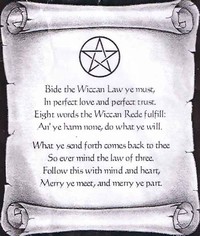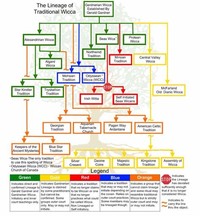Facts about Wicca

The movement received public attention in 1954 when a British civil servant named Gerald Gardner claimed that Wicca had secretly existed for thousands of years, originating in the pre-Christian Paganism of Europe.

Gardnerian Wicca was an initiatory mystery religion, admission to which was limited to those who were initiated into a pre-existing coven.

Gardner used these concepts as his central theological doctrine and constructed Wicca around this core.

The Rede is found in many Wiccan works, including Gardner's, and is the beginning or core of an expanded explanation of morality.

The age claims of Wicca have also been disputed by scholars, who find little in modern Wicca that is congruent with the ancient rites being emulated.

According to Gerald Gardner, the religion derives from a secret but widespread witch-cult of early modern Europe, which incorporated all of the key religious beliefs, ideals, and the distinctive ritual structures found in modern Wicca.

Many Wiccans promote the "Law of Threefold Return," a belief that anything that one does will be returned to them threefold.

Wicca is thus generally considered to be distinct from witchcraft, which does not of itself imply any specific religious, ethical, or ritual elements, and is practiced in various forms by people of many religions.

Raymond Buckland (an initiate of Gardner) introduced modern Wicca to America after moving to Long Island in the 1960s.

A sensationalized aspect of Wicca, particularly in Gardnerian Wicca, is that some Wiccans practice naked (or "skyclad").

Despite the fact that several versions of the Book of Shadows have now been publicly published, many traditions of Wicca still maintain strict secrecy regarding the book and certain other aspects of the religion.

Wiccan weddings can be called "bondings," "joinings," or "eclipses" but are most commonly referred to as "handfastings."

Many Wiccan traditions hold that the ideal number of members for a coven is thirteen, though this is an ideal and not a rule.

A recurrent belief amongst Wiccans is that no magic should be performed on any other person without that person's direct permission (excepting pets, which cannot give explicit permission for such an act).

The association of Wicca with witchcraft has aroused suspicion and contempt in many people, and has forced many Wiccans to practice in secret.

Wiccans can also be "promoted" into higher ranks such as head priestess or head priest.

Despite the popular negative connotations associated with witchcraft, Wiccans see their use of witchcraft as positive and good, and evil magic is viewed as antithetical to Wiccan beliefs and activities.

The movement became known as "Alexandrian Wicca" (as opposed to Gardnerian Wicca).

Due to the open and uncontrolled structure of the religion there are no precise statistics for Wicca; however, estimates range between 50,000 and 800,000 practitioners world-wide.

Wicca (Old English for "male witch"; feminine wicce), also known as the "Old Religion," is a Neopagan religion characterized by secret initiation rituals, reverence for Mother nature, and worship of the Goddess.

According to Gardner, Wicca is rooted in the ancient matriarchal Pagan religions of prehistoric Europe.

In all areas of behavior, magical or otherwise, Wiccan morality can be summarized in a principle that is commonly titled "The Wiccan Rede."

Wiccans typically mark each full moon (and in some cases new moons) with a ritual called an Esbat.

Wicca is a religion, and although its adherents often identify as witches, Wicca and witchcraft are not the same.

Wicca has developed in several ways since it was first openly discussed by Gerald Gardner.

Alexandrian Wicca had a stronger focus on ritual magic, and its founders spent much time initiating in continental Europe.

Most initiated Wiccans can trace their initiatory lineage back to Gardner or one of the Sanders.

The exact beginnings of Wicca are obscure and the history of Wicca is much debated.

The elements are revered in Wicca as the primordial stuff from which all creation can exist, similar to the classical Chinese understanding of Yin and Yang.

The partnership of the Wiccan Goddess and God is generally viewed as dynamic and complementary, with neither dominating; however in some traditions, such as Dianic Wicca, the Goddess alone is worshiped.

Another significant development was the creation by feminists of "Dianic Wicca," or feminist Dianic Witchcraft.

A significant number of Wiccans from various traditions do not claim to be dualist, but practice some form of polytheism, often with particular reference to the Celtic pantheons.

Wiccan ethics require that magical activities are limited to good purposes only.

Many Wiccans also seek to cultivate the Eight Wiccan Virtues as a guideline for their deeds.

The pentagram is the symbol most commonly associated with Wicca in modern times.

Many Dianic Wiccans felt that witchcraft was every woman's right and heritage to claim.

Some solitary Wiccans also choose to study for a year and a day before dedicating themselves to the religion.

Wiccans may worship a Goddess and/or a God and they observe the festivals of the eight Sabbats (holy days) of the year and the full-moon celebrations (Esbats); and most follow a similar moral code.

Wicca does, however, incorporate a specific form of witchcraft, with particular ritual practices, involving the casting of spells, herbalism, divination, and other forms of magic.

Various related Wiccan traditions have since evolved from Gardner's time, with their own specific beliefs, rituals, and practices.


